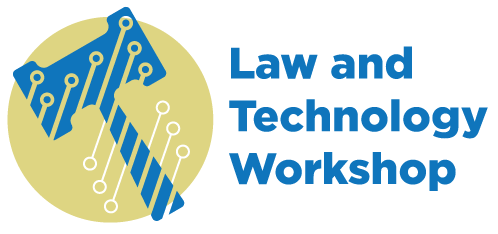Skip to content
2022–2023
- September 21, 2022, Daniel Schwarcz (Minnesota) – How Privilege Undermines Cybersecurity; discussant: Asaf Lubin (Indiana)
- October 19, 2022, Blake Reid (Colorado) – The Incoherence of Common Carriage Law; discussant: Tejas N. Narechania (Berkeley)
- November 16, 2022, Janet Freilich (Fordham) – Patents’ New Salience; discussant: Rebecca Wolitz (Ohio)
- December 19, 2022 [Monday session], Bryan Choi (Ohio) – Cyber Trust in NIST; discussant: Derek Bambauer (Arizona)
- January 18, 2023, Yan Fang (Berkeley) – The Managerialization of Search Law and Procedure for Internet Evidence; discussant: Matthew Tokson (Utah)
- February 15, 2023, Andrew Gilden (Willamette) – The Queer Limits of Revenge Porn; discussant: Kendra Albert (Harvard)
- March 15, 2023, Greg Dickinson (St. Thomas, Florida) – Privately Policing Dark Patterns; discussant: Ryan Calo (Washington)
- April 26, 2023 [moved from April 19], Amanda Levendowski (Georgetown) – Defragging Feminist Cyberlaw; discussant: Carys Craig (York)
- May 17, 2023, Shelly Simana (Stanford) – Genetic Fiduciaries: Rethinking Genome Governance; discussant Jorge Contreras (Utah)
- June 21, 2023, Fanna Gamal (UCLA) – The Racial Proxy; discussant: Jessica Eaglin (Indiana)
- July 19, 2023, Chinmayi Sharma (Texas) – A Framework for Interoperability Interventions; discussant Mark Lemley (Stanford)
2021-2022
- November 3, Jessica Eaglin (Indiana) – Algorithms as Racial Ideology in Law; discussant: Ngozi Okidegbe (Cardozo)
- December 8, Anat Lior (Yale) – Insuring AI: The Role of Insurance in Artificial Intelligence Regulation; discussant: Daniel Schwarcz (Minnesota)
- January 12, Andrew Woods (Arizona) – The Public Cost of Private Platforms; discussant: Jane Bambauer (Arizona)
- February 9, Tiffany Li (New Hampshire) – Algorithmic Shadow Harms; discussant: Ari E. Waldman (Northeastern)
- March 9, Itay Ravid (Villanova) & Amit Haim (Stanford) – Progressive Algorithm; discussant: Margaret Hu (Penn State)
- April 13, Brenda Dvoskin (Harvard) – Speaking Back to Sexual-Privacy Invasions; discussant: Thomas Kadri (Georgia)
- May 11, Brad Greenwood (George Mason) & Paul Vaaler (Minnesota) – All For Naught: An Empirical Examination of the Impact of Breach Notification Laws; discussant: Gus Hurwitz (Nebraska)
- June 15, Yael Lifshitz (King’s College London) – Property Beyond Land; discussant: João Marinotti (Indiana)
- July 28, Gregory Dickinson, The Internet Immunity Escape Hatch
- July 14, Mailyn Fidler, A Partial Property Rights Theory of the Fourth Amendment
- June 23, Afsaneh Rigot, Tech, Law and Human Rights: MENA LGBTQ Prosecutions Case Study
- June 9, Asaf Lubin and João Marinotti, Equity and Self Help in Cyberspace: The Law on Court Authorized Hack-backs and Botnet Takedowns
- May 26, Matt Wansley, The End of Accident Liability
- May 12, Bryan Choi, AI Malpractice
- April 28, Nizan Geslevich Packin, Show Me the (Data About the) Money!
- April 14, Kyle Langvardt, Checking Apex Platforms
- March 24, Daniel Maggen, Bad Learning: Algorithmic Decisions and Legal Progress
- March 10, Maria Lucia Passador, Artificial Intelligence for Post-Covid Companies: An Empirical Analysis of Tech Committees in the EU and the US
- February 10, Tabrez Ebrahim, A Fiduciary Theory of Corporate Cybersecurity
- January 27, Kate Klonick Facebook Oversight Board’s First Decisions
- Jan 13,Ngozi Okidegbe, The Democratizing Potential of Algorithms
- Dec 9,George Wang, De-Coding Free Speech
- Nov 11, Nikolas Guggenberger, Essential Platforms
- Sept 23, Lauren Scholz, Privacy as Private Law: Rule Of Law In The Private Sphere
- Sept 9, Andrew Keane Roods, Robophobia
- Aug 26, Mailyn Fidler, Situational Right to Exclude: A Privacy-Protective Return To A Property-Based Fourth Amendment
- July 2, Aaron Cooper, Congressional Surveillance
- June 18, Jacob Victor, Utility-Expanding Fair Use
- June 11, Lauren Scholz, Fiduciary Boilerplate
- May 7, Kiel Brennan-Marquez & Daniel Susser, Risk, Fairness, And Radical Informational Asymmetry
- May 21, Charlotte Tschider, Beyond The Black Box
- April 23, Half-Baked Ideas: Elana Zeide, “Scored Society” And Ensuring Fair Algorithmic Decisions, And Blake Reid, Copyright’s Role In The Accessibility Of Creative Works
- April 16, Rebecca Crootof & Bj Ard, Structuring Techlaw
- April 9, Half-Baked Ideas: Alan Rozenshtein, Disease Surveillance and The Fourth Amendment and Josh Fairfield, on TBD
- April 2, “The Quarantine Reading List”
